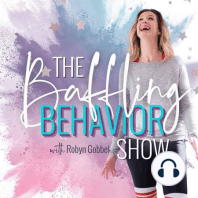34 min listen

Ep. 31: Lisa Dion on how Regulation Does Not Equal Calm
Ep. 31: Lisa Dion on how Regulation Does Not Equal Calm
ratings:
Length:
56 minutes
Released:
May 18, 2021
Format:
Podcast episode
Description
What if I told you that calm isn't best? Calm isn't what we are working toward! And prioritizing calm gives other states of the nervous system a bad wrap! Calm is just a byproduct of an attempt to regulate! In fact, there are risks to focusing on calm as our primary goal. On today's episode, I'm thrilled to introduce you to Lisa Dion, LPC, RPT-S, is an international teacher, creator of Synergetic Play Therapy, founder and President of the Synergetic Play Therapy Institute, and host of the Lessons from the Playroom podcast. She is the author of Aggression in Play Therapy: A Neurobiological Approach for Integrating Intensity and is the 2015 recipient of the Association for Play Therapy’s Professional Education and Training Award of Excellence.Lisa and I have a lovely time discussing the difference between regulated and calm, including the risks of pretending to be calm when we aren't. As parents and clinicians who care for kids with a history of trauma, it's important to negotiate ways within ourselves that we can be honest and congruent with our true experiences (maybe we are mad!) while still remaining regulated and offering felt-safety. Wait what?! Regulated and mad?!?!Yup. Regulated and mad. Have a listen to see what Lisa has to say about this!You can find more of Lisa's work over at Synergetic Play Therapy Institue, including her book for clinicians, Aggression in Play Therapy.**************************************If you loved this exploration into the neurobiology of regulation, you'll love all the free resources over on my website, especially my recent masterclass on What Behavior Really Is! You can grab this free video series at www.RobynGobbel.com/masterclassWhile you're over on my website, check out my virtual community for parents impacted by trauma- The Club. A member of The Club, who also happens to work with parents of kids imapcted by trauma, recently wrote to me and said: I’ve been working with families adopting children with trauma for almost ten years now, and it is the best thing I’ve seen in this community to give families access to the practical tools they need to parent their children, but even more importantly make them feel seen, loved, and supported by a community that truly understands their challenges and struggles. What you are building is nothing short of amazing. CLICK HERE to read about The Club and join the waitlist for the next time we welcome new members*****Not sure where to start? With 100 episodes, it's hard to know what episodes to listen to first!The START HERE private podcast takes the guess-work out. I curated the 10 episodes I think you should listen to first. Because it's a special private podcast, It's only available by invitation- so head over to RobynGobbel.com/StartHere to get yours. You'll then be able to listen in whatever podcast player you use! *******The Club is a virtual community for the families of kids with big, baffling behaviors and the professionals who support them. https://robyngobbel.com/theclubApplications for the 2023 cohort of Being With ~ a year-long immersive and holistic program for parenting professionals ~ are now open! https://robyngobbel.com/beingwith
Released:
May 18, 2021
Format:
Podcast episode
Titles in the series (100)
Not Flipping Your Lid...When Your Kid Flips Theirs by The Baffling Behavior Show {Parenting after Trauma}